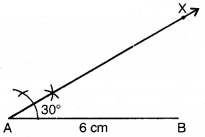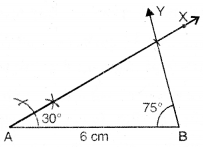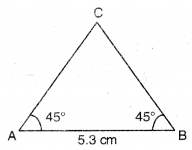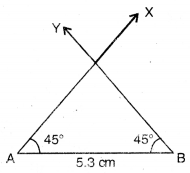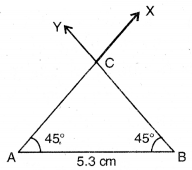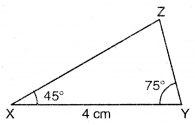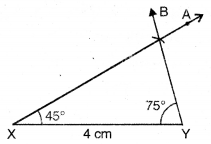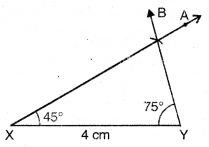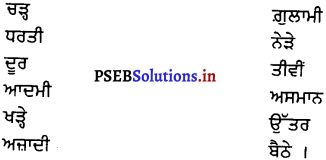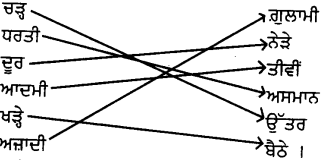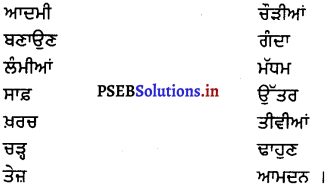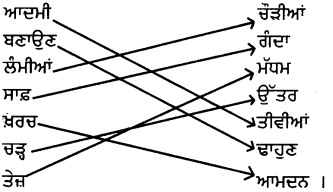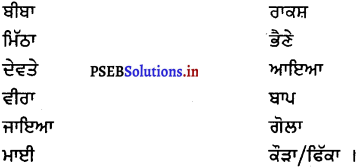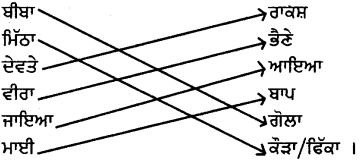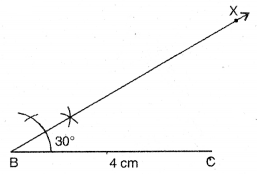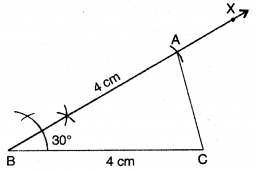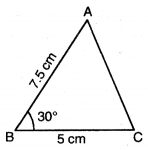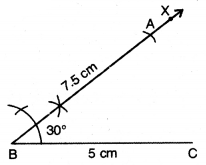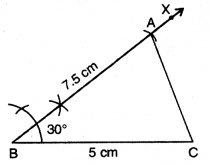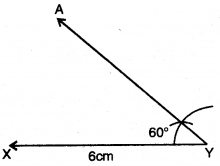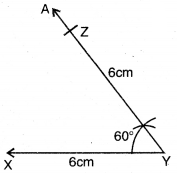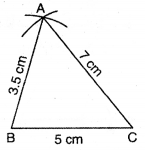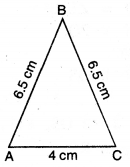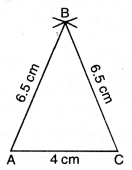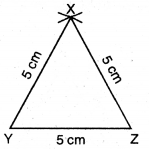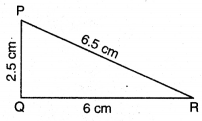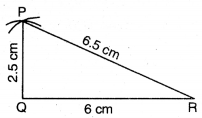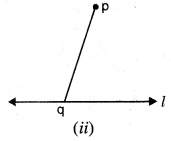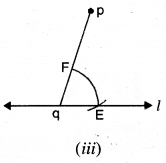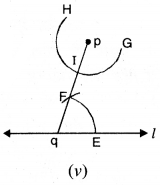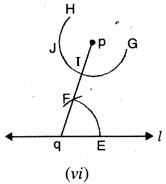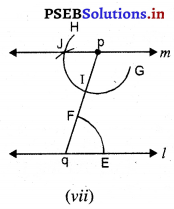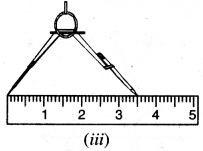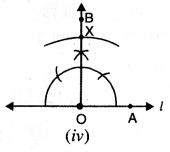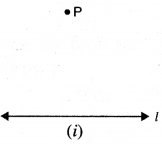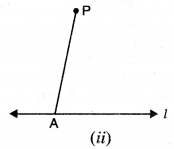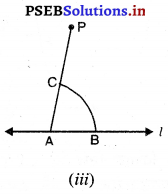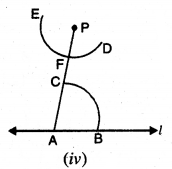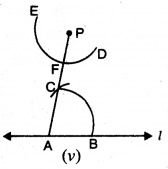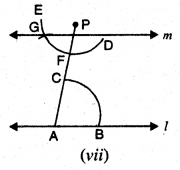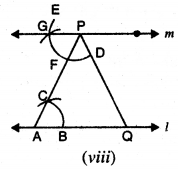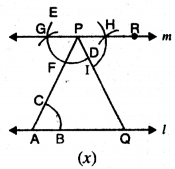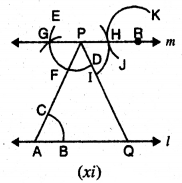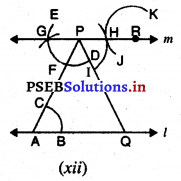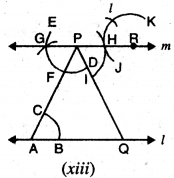Punjab State Board PSEB 10th Class Social Science Book Solutions Geography Chapter 2 धरातल Exercise Questions and Answers.
PSEB Solutions for Class 10 Social Science Geography Chapter 2 धरातल
SST Guide for Class 10 PSEB धरातल Textbook Questions and Answers
I. निम्नलिखित में से प्रत्येक प्रश्न का एक शब्द या एक वाक्य में उत्तर दीजिए
प्रश्न 1.
भारत की प्रमुख भौतिक इकाइयों के नाम लिखिए।
उत्तर-
भारत की प्रमुख भौतिक इकाइयां हैं-(i) हिमालय पर्वतीय क्षेत्र, (ii) उत्तरी विशाल मैदान, (iii) प्रायद्वीपीय पठार का क्षेत्र, (iv) तटीय मैदान, (v) भारतीय द्वीप।
प्रश्न 2.
हिमालय पर्वत श्रेणी का आकार कैसा है?
उत्तर-
हिमालय पर्वत श्रेणी का आकार एक उत्तल चाप (Convex Curve) जैसा है।
प्रश्न 3.
ट्रांस हिमालय की प्रमुख चोटियों के नाम बताइए।
उत्तर-
ट्रांस हिमालय की मुख्य चोटियां हैं-माऊंट के (K2), गाडविन ऑस्टिन, हिडन पीक, ब्राड पीक, गैशरबूम, राकापोशी तथा हरमोश।

प्रश्न 4.
बृहत् हिमालय में 8000 मीटर से अधिक ऊंची चोटियां कौन-कौन सी हैं?
उत्तर-
बृहत् हिमालय की 8000 मीटर से अधिक ऊंची चोटियां हैं-माऊंट एवरेस्ट (8848 मीटर), कंचन जंगा (8598 मीटर), मकालू (8481 मीटर), धौलागिरी (8172 मीटर), मनायशू, चोंउज, नागापर्वत तथा अन्नपूर्णा।
प्रश्न 5.
भारत की युवा एवं प्राचीन पर्वत मालाओं के नाम बताइए।
उत्तर-
हिमालय पर्वत भारत के युवा पर्वत हैं और यहां के प्राचीन पर्वत अरावली, विन्ध्याचल, सतपुड़ा आदि हैं।
प्रश्न 6.
देश में रिफ्ट या दरार घाटियां कहां मिलती हैं?
उत्तर-
भारत में दरार घाटियां प्रायद्वीपीय पठार में पाई जाती हैं।

प्रश्न 7.
डेल्टा से क्या अभिप्राय है?
उत्तर-
नदी द्वारा अपने मुहाने पर बने स्थल-रूप को डेल्टा कहते हैं।
प्रश्न 8.
भारत के मुख्य डेल्टाई क्षेत्रों के नाम बताओ।
उत्तर-
भारत के प्रमुख डेल्टाई क्षेत्र हैं-गंगा-ब्रह्मपुत्र डेल्टा क्षेत्र, गोदावरी नदी डेल्टा क्षेत्र, कावेरी नदी डेल्टा क्षेत्र, कृष्णा नदी डेल्टा क्षेत्र तथा महानदी का डेल्टा क्षेत्र।
प्रश्न 9.
हिमालय पर्वत के दरों के नाम बताइए।
उत्तर-
हिमालय पर्वत में पाये जाने वाले मुख्य दरै हैं-बुरजिल, जोझीला, लानक ला, चांग ला, खुरनक ला, बाटा खैपचा ला, शिपकी ला, नाथु ला, तत्कला कोट इत्यादि।

प्रश्न 10.
लघु हिमालय की मुख्य पर्वत श्रेणियों के नाम बताइए।
उत्तर-
लघु हिमालय की पर्वत श्रेणियां हैं-(i) कश्मीर में पीर पंजाल तथा नागा टिब्बा, (ii) हिमाचल में धौलाधार तथा कुमाऊं, (iii) नेपाल में महाभारत, (iv) उत्तराखण्ड में मसूरी, (v) भूटान में थिम्पू।
प्रश्न 11.
लघु हिमालय में स्थित स्वास्थ्यवर्धक घाटियों के नाम बताइए।
उत्तर-
लघु हिमालय के मुख्य स्वास्थ्यवर्धक स्थान शिमला, श्रीनगर, मसूरी, नैनीताल, दार्जिलिंग तथा चकराता हैं।
प्रश्न 12.
देश की प्रमुख ‘दून’ घाटियों के नाम बताइए।
उत्तर-
देश की मुख्य दून घाटियां हैं-देहरादून, पतली दून, कोथरीदून, ऊधमपुर, कोटली आदि।

प्रश्न 13.
हिमालय क्षेत्र की पूर्वी किनारे वाली प्रशाखाओं (Eastern off shoots) के नाम बताइए।
उत्तर-
हिमालय की प्रमुख पूर्वी श्रेणियां पटकोई बम्म, गारो, खासी, जयन्तिया तथा त्रिपुरा की पहाड़ियां हैं।
प्रश्न 14.
उत्तर के विशाल मैदानों में नदियों द्वारा निर्मित प्रमुख भू-आकृतियों के नाम बताइए।
उत्तर-
उत्तरी मैदानों में नदियों द्वारा निर्मित भू-आकार हैं-जलोढ़ पंख, जलोढ़ शंकु, सर्पदार मोड़, दरियाई सीढ़ियां, प्राकृतिक बांध तथा बाढ़ के मैदान।।
प्रश्न 15.
ब्रह्मपुत्र के मैदानों का आकार (Size) क्या है?
उत्तर-
ब्रह्मपुत्र का मैदान 640 किलोमीटर लम्बा तथा 90 से 100 किलोमीटर तक चौड़ा है।

प्रश्न 16.
अरावली पर्वत श्रेणी का विस्तार कहां से कहां तक है तथा इसकी सबसे ऊंची चोटी का नाम क्या है?
उत्तर-
अरावली पर्वत श्रेणी दिल्ली से गुजरात तक फैली हुई है। इसकी सबसे ऊंची चोटी का नाम गुरु शिखर (1722 मीटर) है।
प्रश्न 17.
पश्चिमी घाट की ऊंची चोटियों के नाम बताओ।
उत्तर-
पश्चिमी घाट की ऊंची चोटियां हैं-वाणुला माला (2339 मी०), कुदरमुख (1894 मी०), पुष्पगिरी (1714 मी०), कालसुबाई (1646 मी०) इत्यादि।
प्रश्न 18.
पूर्वी घाट की दक्षिणी पहाड़ियों के नाम बताइए।
उत्तर-
जवद्दी (Jawaddi), गिन्गी, शिवराई, कौलईमाला, पंचमलाई, गोंडुमलाई इत्यादि पूर्वी घाट की दक्षिणी पहाड़ियां हैं।

प्रश्न 19.
अन्नाई मुदी की पर्वत गांठ पर कौन-कौन सी पर्वत श्रेणियां आकर मिलती हैं?
उत्तर-
कार्डमम या ईलामी (Elami), अन्नामलाई तथा पलनी।
प्रश्न 20.
दक्षिणी पठार के पहाड़ी भागों पर कौन-कौन से रमणीय स्थान ( हिल स्टेशन) हैं?
उत्तर-
दोदाबेटा, ऊटाकमुंड, पलनी तथा कोडाईकनाल।
प्रश्न 21.
उत्तर-पूर्वी तटवर्ती मैदान के उप-भागों के नाम बताओ।
उत्तर-
उत्तर-पूर्वी तटीय मैदान के उप-भाग हैं- (i) उड़ीसा के मैदान, (ii) उत्तरी सरकार।

प्रश्न 22.
अरब सागर में मिलने वाले द्वीपों के नाम बताओ।
उत्तर-
अरब सागर में स्थित उत्तरी द्वीपों को अमीनदिवी (Aminodivi), मध्यवर्ती द्वीपों को लक्काद्वीप तथा दक्षिणी भाग को मिनीकोय कहा जाता है।
प्रश्न 23.
देश के तट के समीप द्वीपों के नाम बताओ।
उत्तर-
देश के तट के समीप सागर, शोरट, न्युमूर, भासरा, मंढापस, ऐलिफैंटा, दीव (Diu) आदि द्वीप मिलते हैं।
प्रश्न 24.
देश का दक्षिणी बिन्द कहां स्थित है?
उत्तर-
देश का दक्षिणी बिन्दु ग्रेट निकोबार के इंदिरा प्वाइंट (Indira Point) पर स्थित है।

II. निम्नलिखित प्रश्नों का संक्षिप्त उत्तर दो —
प्रश्न 1.
हिमालय पर्वत माला एवं दक्षिण के पठार के बीच क्या कुछ समानताएं पायी जाती हैं?
उत्तर-
हिमालय पर्वत तथा दक्षिण के पठार में निम्नलिखित समानताएं पायी जाती हैं
- हिमालय पर्वत का निर्माण दक्षिणी पठार की उपस्थिति के कारण हुआ है।
- प्रायद्वीपीय पठार की पहाड़ियां, भ्रंश घाटियां तथा अपभ्रंश हिमालय पर्वत श्रृंखला से आने वाले दबाव के कारण बनी है।
- हिमालय पर्वतों की भान्ति दक्षिणी पठार में भी अनेक खनिज पदार्थ पाये जाते हैं।
- इन दोनों भौतिक भागों में वन पाये जाते हैं जो देश में लकड़ी की मांग को पूरा करते हैं।
प्रश्न 2.
क्या हिमालय पर्वत अभी भी युवा अवस्था में है?
उत्तर-
इसमें कोई सन्देह नहीं है कि हिमालय पर्वत अभी भी युवा अवस्था में है। इनकी उत्पत्ति नदियों द्वारा टैथीज सागर में बिछाई गई तलछट से हुई है। बाद में इसके दोनों ओर स्थित भूखण्डों के एक-दूसरे की ओर खिसकने से तलछट में मोड़ पड़ गया जिससे हिमालय पर्वतों के रूप में ऊपर उठ आए। आज भी ये पर्वत ऊंचे उठ रहे हैं। इसके अतिरिक्त इन पर्वतों का निर्माण देश के अन्य पर्वतों की तुलना में काफ़ी बाद में हुआ। अतः हम कह सकते हैं कि हिमालय पर्वत अभी भी अपनी युवा अवस्था में हैं।
प्रश्न 3.
बृहत् हिमालय की धरातलीय विशेषताओं पर प्रकाश डालिए।
उत्तर-
महान् हिमालय पश्चिम में सिन्धु नदी की घाटी से लेकर उत्तर-पूर्व में ब्रह्मपुत्र की दिहांग घाटी तक फैला हुआ है। इसकी मुख्य धरातलीय विशेषताओं का वर्णन इस प्रकार है-
- यह देश की सबसे लम्बी तथा रची पर्वत श्रेणी है। इसमें ग्रेनाइट तथा नीस जैसी परिवर्तित रवेदार चट्टानें मिलती
- इसकी चोटियां बहुत ऊंची हैं। संसार की सबसे ऊंची पर्वत चोटी माऊंट एवरेस्ट (8848 मीटर) इसी पर्वत श्रृंखला में स्थित है। यहां की चोटियां सदा बर्फ से ढकी रहती हैं।
- इसमें अनेक रे हैं जो पर्वतीय मार्ग जुटाते हैं।
- इसमें काठमाण्डू तथा कश्मीर जैसी महत्त्वपूर्ण घाटियां स्थित हैं।

प्रश्न 4.
उत्तरी विशाल मैदानी भाग में किस-किस जलोढ़ी मैदान का निर्माण हुआ है?
उत्तर-
उत्तरी विशाल मैदान में निम्नलिखित जलोढ़क मैदानों का निर्माण हुआ है —
- खादर के मैदान,
- बांगर के मैदान,
- भाबर के मैदान,
- तराई के मैदान,
- बंजर मैदान।
प्रश्न 5.
थार मरुस्थल पर एक संक्षिप्त भौगोलिक लेख लिखो।
उत्तर-
थार मरुस्थल पंजाब तथा हरियाणा के दक्षिणी भागों से लेकर गुजरात के रण ऑफ़ कच्छ तक फैला हुआ है। यह मरुस्थल समतल तथा शुष्क है। अरावली पर्वत श्रेणी इसकी पूर्वी सीमा बनाती है। इसके पश्चिम में अन्तर्राष्ट्रीय सीमा लगती है। यह लगभग 640 कि० मी० लम्बा तथा 300 कि० मी० चौड़ा है। अति प्राचीन काल में यह क्षेत्र समुद्र के नीचे दबा हुआ था। ऐसे भी प्रमाण मिलते हैं कि यह मरुस्थल किसी समय उपजाऊ रहा होगा। परन्तु वर्षा की मात्रा बहुत कम होने के कारण आज यह क्षेत्र रेत के बड़े-बड़े टीलों में बदल गया है।
प्रश्न 6.
स्थिति के आधार पर भारतीय द्वीपों को कितने भागों में बांटा जा सकता है?
उत्तर-
स्थिति के अनुसार भारत के द्वीपों को दो मुख्य भागों में बांटा जा सकता है-तट से दूर स्थित द्वीप तथा तट के निकट स्थित द्वीप।
- तट से दूर स्थित द्वीप-इन द्वीपों की कुल संख्या 230 के लगभग है। ये समूहों में पाये जाते हैं। दक्षिणी-पूर्वी अरब सागर में स्थित ऐसे द्वीपों का निर्माण प्रवाल भित्तियों के जमाव से हुआ है। इन्हें लक्षद्वीप कहते हैं। अन्य द्वीप क्रमशः अमीनदिवी, लक्काद्वीप तथा मिनीकोय के नाम से प्रसिद्ध हैं। बंगाल की खाड़ी में तट से दूर स्थित द्वीपों के नाम हैं-अण्डमान द्वीप समूह, निकोबार, नारकोडम तथा बैरन आदि।
- तट के निकट स्थित द्वीप-इन द्वीपों में गंगा के डेल्टे के निकट स्थित सागर, शोरट, ह्वीलर, न्युमूर आदि द्वीप शामिल हैं। इस प्रकार के अन्य द्वीप हैं-भासरा, दीव, बन, ऐलिफंटा इत्यादि।

प्रश्न 7.
तटवर्ती मैदानों की देश को क्या महत्त्वपूर्ण देन है ?
उत्तर-
तटीय मैदानों की देश को निम्नलिखित देन है —
- तटीय मैदान बढ़िया किस्म के चावल, खजूर, नारियल, मसालों, अदरक, लौंग, इलायची आदि की कृषि के लिए विख्यात हैं।
- ये मैदान अन्तर्राष्ट्रीय व्यापार में अग्रणी हैं।
- इन मैदानों से समस्त देश में बढ़िया प्रकार की समुद्री मछलियां भेजी जाती हैं।
- तटीय मैदानों में स्थित गोआ, तमिलनाडु तथा मुम्बई के समुद्री बीच पर्यटकों के लिए आकर्षण का केन्द्र हैं।
- देश में प्रयोग होने वाला नमक पश्चिमी तटीय मैदानों में तैयार किया जाता है।
प्रश्न 8.
हिमालय क्षेत्रों का देश के विकास में योगदान बताइए।
उत्तर-
हिमालय क्षेत्रों का देश के विकास में निम्नलिखित योगदान है —
- वर्षा-हिन्द महासागर से उठने वाली मानसून पवनें हिमालय पर्वत से टकरा कर खूब वर्षा करती हैं। इस प्रकार यह उत्तरी मैदान में वर्षा का दान देता है। इस मैदान में पर्याप्त वर्षा होती है।
- उपयोगी नदियां-उत्तरी भारत में बहने वाली गंगा, यमुना, सतलुज, ब्रह्मपुत्र आदि सभी मुख्य नदियां हिमालय पर्वत से ही निकलती हैं। ये नदियां सारा साल बहती हैं। शुष्क ऋत में हिमालय की बर्फ इन नदियों को जल देती है।
- फल तथा चाय-हिमालय की ढलानें चाय की खेती के लिए बड़ी उपयोगी हैं। इनके अतिरिक्त पर्वतीय ढलानों पर फल भी उगाए जाते हैं।
- उपयोगी लकडी-हिमालय पर्वत पर घने वन पाये जाते हैं। ये वन हमारा धन हैं। इनसे प्राप्त लकड़ी पर भारत के अनेक उद्योग निर्भर हैं। यह लकड़ी भवन निर्माण कार्यों में भी काम आती है।
- अच्छे चरागाह-हिमालय पर हरी-भरी चरागाहें मिलती हैं। इनमें पशु चराये जाते हैं।
- खनिज पदार्थ-इन पर्वतों में अनेक प्रकार के खनिज पदार्थ पाए जाते हैं।
प्रश्न 9.
प्रायद्वीपीय पठार देश के अन्य भागों को कैसे प्रभावित करता है?
उत्तर-
- प्रायद्वीपीय पठार प्राचीन गोंडवाना लैंड का भाग है। इसी से निकलने वाली नदियों ने पहले हिमालय का निर्माण किया और फिर हिमालय तथा अपने यहां से बहने वाली नदियों के तलछट से विशाल उत्तरी मैदानों का निर्माण किया।
- प्रायद्वीपीय पठार के दोनों ओर घाटों पर बने जल-प्रपात तटीय मैदानों को सिंचाई के लिए जल तथा औद्योगिक विकास के लिए बिजली देते हैं।
- यहां के वन देश के अन्य भागों में लकड़ी की मांग को पूरा करते हैं।

प्रश्न 10.
निम्नलिखित में अन्तर स्पष्ट करें(i) तराई और भाबर, (ii) बांगर और खादर।
उत्तर-
- तराई और भाबर–भाबर वे मैदानी प्रदेश होते हैं जहां नदियां पहाड़ों से निकलते ही तुरन्त मैदानी प्रदेश .में प्रवेश करती हैं और अपने साथ लाए रेत, कंकड़, बजरी, पत्थर आदि का यहां निक्षेप करती हैं। भाबर क्षेत्र में नदियां भूमि तल पर बहने की बजाए भूमि के नीचे बहती हैं। जब भाबर मैदानों की भूमिगत नदियां पुनः भूमि पर उभरती हैं, तो ये दलदली क्षेत्रों का निर्माण करती हैं। शिवालिक पहाड़ियों के समानान्तर फैली इस आर्द्र तथा दलदली भूमि की पट्टी को तराई प्रदेश कहते हैं। यहां घने वन भी पाये जाते हैं तथा जंगली जीव जन्तु भी अधिक संख्या में मिलते हैं।
- बांगर और खादर-उत्तर प्रदेश, बिहार तथा पश्चिमी बंगाल में बहने वाली नदियों में प्रत्येक वर्ष बाढ़ आ जाती है और वे अपने आस-पास के क्षेत्रों में मिट्टी की नई परतें बिछा देती हैं। बाढ़ से प्रभावित इस तरह के मैदानों को खादर के मैदान कहा जाता है। – बांगर वह ऊंची भूमि होती है जो बाढ़ के पानी से प्रभावित नहीं होती और जिसमें चूने के कंकड़-पत्थर अधिक मात्रा में मिलते हैं। इसे रेह तथा कल्लर भूमि भी कहते हैं।
III. निम्नलिखित प्रश्नों के विस्तृत उत्तर दें —
प्रश्न 1.
भारत को धरातलीय आधार पर विभिन्न भागों में बांटो तथा किसी एक भाग का विस्तार से वर्णन करो।
उत्तर-
धरातल के आधार पर भारत को हम पाँच भौतिक विभागों में बांट सकते हैं —
- हिमालय पर्वतीय क्षेत्र
- विशाल उत्तरी मैदान
- प्रायद्वीपीय पठार का क्षेत्र
- तट के मैदान
- भारतीय द्वीप।
इनमें से हिमालय पर्वतीय क्षेत्र का वर्णन इस प्रकार है —
हिमालय पर्वतीय क्षेत्र-हिमालय पर्वत भारत की उत्तरी सीमा पर एक चाप के रूप में फैले हैं। पूर्व से पश्चिम तक इसकी लम्बाई 2400 कि० मी तथा चौड़ाई 240 से 320 कि० मी० तक है।
ऊंचाई के आधार पर हिमालय पर्वतों को निम्नलिखित पाँच उपभागों में बांटा जा सकता है —
- ट्रांस हिमालय-इस विशाल पर्वत-श्रेणी का अधिकांश भाग तिब्बत में होने के कारण इसे तिब्बती हिमालय भी कहा जाता है। इसकी कुल लम्बाई 970 कि० मी० तथा चौड़ाई (किनारों पर) 40 किमी० है। इन पर्वतों की औसत ऊंचाई 6100 मी० है। माऊंट K2 तथा गॉडविन ऑस्टिन (8611 मी०) इन पर्वतों की सबसे ऊंची चोटियां हैं।
- महान् हिमालय-यह भारत की सबसे लम्बी तथा ऊंची पर्वत-श्रेणी है। इसकी लम्बाई 2400 कि० मी० तथा चौड़ाई 100 से 200 कि० मी० तक है। इसकी औसत ऊंचाई 6000 मीटर है। संसार की सबसे ऊंची चोटी माऊंट एवरेस्ट (8848 मी०) इसी पर्वत श्रेणी में स्थित है।
- लघु-हिमालय-इसे मध्य हिमालय भी कहा जाता है। इसकी औसत ऊंचाई 3500 मी० से लेकर 5000 मी० तक है। इस पर्वत श्रेणी की ऊंची चोटियां शीत ऋतु में बर्फ से ढक जाती हैं। यहां शिमला, श्रीनगर, मसूरी, नैनीताल, दार्जिलिंग, चकराता आदि स्वास्थ्यवर्धक स्थान पाये जाते हैं।
- बाह्य हिमालय-इस पर्वत श्रेणी को शिवालिक श्रेणी, उप-हिमालय तथा दक्षिणी हिमालय के नाम से भी पुकारा जाता है। इन पर्वतों के दक्षिण में कई झीलें पायी जाती थीं। बाद में इनमें मिट्टी भर गई और इन्हें दून (Doon) (पूर्व में इन्हें द्वार (Duar) कहा जाता है) कहा जाने लगा। इनमें देहरादून, पतलीदून, कोथरीदून, ऊधमपुर, कोटली आदि शामिल हैं।
- पहाड़ी शाखाएं-हिमालय पर्वतों की दो शाखाएं हैं-पूर्वी शाखाएं तथा पश्चिमी शाखाएं।
पूर्वी शाखाएं-इन शाखाओं को पूर्वांचल भी कहा जाता है।
इन शाखाओं में ढ़फा बुम, पटकाई बुम, गारो, खासी, जैंतिया तथा त्रिपुरा की पहाड़ियां सम्मिलित हैं।
पश्चिमी शाखाएं-उत्तर-पश्चिम में पामीर की गांठ से हिमालय की दो उपशाखाएं बन जाती हैं। एक शाखा पाकिस्तान की साल्ट रेंज, सुलेमान तथा किरथर होते हुए दक्षिण-पश्चिम में अरब सागर तक पहुंचती है। दूसरी शाखा अफ़गानिस्तान में स्थित हिम्दुकुश तथा कॉकेशस पर्वत श्रेणी से जा मिलती है।

प्रश्न 2.
हिमालय की उत्पत्ति एवं बनावट पर लेख लिखो और बताइए कि क्या हिमालय अभी भी बढ़ रहे हैं?
उत्तर-
हिमालय की उत्पत्ति तथा बनावट का वर्णन इस प्रकार है —
उत्पत्ति-जहां आज हिमालय है, वहां कभी टैथीज (Tythes) नाम का सागर लहराता था। यह दो विशाल भू-खण्डों से घिरा एक लम्बा और उथला सागरं था। इसके उत्तर में अंगारा लैंड और दक्षिण में गोंडवानालैंड नाम के दो भू-खण्ड थे। लाखों वर्षों तक इन दो भू-खण्डों का अपरदन होता रहा। अपरदित पदार्थ अर्थात् कंकड़, पत्थर, मिट्टी, गाद आदि टैथीज सागर में जमा होते रहे। ये दो विशाल भू-खण्ड धीरे-धीरे एक-दूसरे की ओर खिसकते रहे। सागर में जमी मिट्टी आदि की परतों में मोड़ (वलय) पड़ने लगे। ये वलय द्वीपों की एक श्रृंखला के रूप में उभर कर पानी की सतह से ऊपर आ गये। कालान्तर में विशाल वलित पर्वत श्रेणियों का निर्माण हुआ, जिन्हें हम आज हिमालय के नाम से पुकारते हैं।
बनावट-हिमालय पर्वतीय क्षेत्र एक उत्तल चाप (Convex Curve) जैसा दिखाई देता है जिसका मध्यवर्ती भाग नेपाल की सीमा तक शुकी हुआ है। इसके उत्तर-पश्चिमी किनारे सफ़ेद कोह, सुलेमान तथा किरथर की पहाड़ियों द्वारा अरब सागर में पहुंच जाते हैं। इसी प्रकार के उत्तर-पूर्वी किनारे टैनेसरीम पर्वत श्रेणियों के माध्यम से बंगाल की खाड़ी तक पहुंच जाते हैं।
हिमालय पर्वतों की दक्षिणी ढाल भारत की ओर है। यह ढाल बहुत ही तीखी है। परन्तु इसकी उत्तरी ढाल साधारण है। यह चीन की ओर है। दक्षिणी ढाल के अधिक तीखा होने के कारण इस पर जल-प्रपात तथा तंग नदी-घाटियां पाई जाती हैं।
ऊंचाई की दृष्टि से हिमालय की पर्वत श्रेणियों को पांच उपभागों में बांटा जा सकता है-
- ट्रांस हिमालय,
- महान् हिमालय,
- लघु हिमालय,
- बाह्य हिमालय तथा
- पहाड़ी शाखाएं।
हिमालय पर्वत की मुख्य विशेषता यह है कि ये आज भी ऊंचे उठ रहे हैं।
प्रश्न 3.
पश्चिमी एवं पूर्वी तटीय मैदानों की तुलना करो।
उत्तर-
पश्चिमी तथा पूर्वी तटीय मैदानों की आपसी तुलना इस प्रकार की जा सकती है —
| पश्चिमी मैदान |
पूर्वी मैदान |
| (1) इनके पश्चिम में अरब सागर और पूर्व में पश्चिमी घाट की पहाड़ियां हैं। |
(1) पूर्वी तट के मैदानों के पूर्व में बंगाल की खाड़ी तथा | पश्चिम में पूर्वी घाट की पहाड़ियां हैं। |
| (2) इन मैदानों की लम्बाई 1500 कि० मी० और चौड़ाई 30 से 80 कि० मी० है। इन मैदानों में डेल्टाई निक्षेप का अभाव है। |
(2) इन मैदानों की लम्बाई 2000 कि० मी० है और इनकी औसत चौड़ाई 150 कि० मी० है। ये अपेक्षाकृत अधिक चौड़े हैं तथा इनमें जलोढ़ मिट्टी का निक्षेप है। |
| (3) पश्चिमी मैदानों को धरातलीय विस्तार के आधार पर चार भागों में बांटते हैं-गुजरात का तटीय मैदान, कोंकण का तटीय मैदान, मालाबार तट का मैदान, केरल का मैदान। |
(3) पूर्वी तटीय मैदान के दो भाग हैं-उत्तरी तटीय मैदान तथा दक्षिण तटीय मैदान। उत्तरी मैदान को उत्तरी सरकार या गोलकुण्डा या काकीनाडा भी कहते हैं। दक्षिण तटीय मैदान को कोरोमण्डल तट भी कहते है। |
| (4) इन मैदानों में नर्मदा तथा ताप्ती नदियां बहती हैं। ये डेल्टा बनाने की बजाए ज्वारनदमुख बनाती है। |
(4) इस मैदान की प्रमुख नदियां महानदी, कावेरी, गोदावरी | तथा कृष्णा हैं। |
| (5) पश्चिमी मैदान में ग्रीष्म काल में वर्षा होती है। यह वर्षा दक्षिण-पश्चिम पवनों के कारण होती है। |
(5) इस मैदान में शरद् ऋतु में वर्षा होती है। यह वर्षा | उत्तर-पूर्वी पवनों के कारण होती है। |

प्रश्न 4.
देश के उत्तरी विशाल मैदानों के आकार, जन्म एवं क्षेत्रीय विभाजन का वर्णन करो।
उत्तर-
भारत के उत्तरी विशाल मैदानों के आकार, जन्म तथा क्षेत्रीय विभाजन का वर्णन इस प्रकार है —
आकार-रावी नदी से लेकर गंगा नदी के डैल्टे तक इस मैदान की कुल लम्बाई लगभग 2400 कि० मी० तथा चौड़ाई 100 से 500 कि० मी० तक है। समुद्र तल से इसकी औसत ऊंचाई 180 मी० के लगभग है। अनुमान है कि इसकी गहराई 5 कि० मी० से लेकर 32 कि० मी० तक है। इसका कुल क्षेत्रफल 7.5 लाख वर्ग कि० मी० है।
जन्म-भारत का उत्तरी मैदान उत्तर में हिमालय तथा दक्षिण में विशाल प्रायद्वीपीय पठार से निकलने वाली नदियों द्वारा बहाकर लाई हुई मिट्टी से बना है। लाखों, करोड़ों वर्ष पहले भू-वैज्ञानिक काल में उत्तरी मैदान के स्थान पर टैथीज नामक एक सागर लहराता था। इस सागर से विशाल वलित पर्वत श्रेणियों का निर्माण हुआ, जिन्हें हम हिमालय के नाम से पुकारते हैं। हिमालय की ऊंचाई बढ़ने के साथ-साथ उस पर नदियां तथा अनाच्छादन के दूसरे कारक सक्रिय हो गए। इन कारकों ने पर्वत प्रदेश का अपरदन किया और यह भारी मात्रा में गाद ला-ला कर टैथीज सागर में जमा करने लगे। सागर सिकुड़ने लगा। नदियां जो मिट्टी इसमें जमा करती रहीं, वह बारीक पंक जैसी थी। इस मिट्टी को जलोढ़क कहते हैं। अतः टैथीज सागर के स्थान पर जलोढ़ मैदान अर्थात् उत्तरी मैदान का निर्माण हुआ।
क्षेत्रीय विभाजन-उत्तरी विशाल मैदान को निम्नलिखित चार क्षेत्रों में बांटा जा सकता है —
- पंजाब हरियाणा का मैदान- इस मैदान का निर्माण सतलुज, रावी, ब्यास तथा घग्घर नदियों द्वारा लाई गई मिट्टियों से हुआ है। इसमें बारी दोआब, बिस्त दोआब, मालवा का मैदान तथा हरियाणा का मैदान शामिल है।
- थार मरुस्थल का मैदान-पंजाब तथा हरियाणा के दक्षिणी भागों से लेकर गुजरात में स्थित कच्छ की रण तक के इस मैदान को थार मरुस्थल का मैदान कहते हैं।
- गंगा का मैदान-गंगा का मैदान उत्तराखंड, उत्तर प्रदेश, बिहार तथा पश्चिम बंगाल में स्थित है।
- ब्रह्मपुत्र का मैदान-इसे असम का मैदान भी कहा जाता है। यह असम की पश्चिमी सीमा से लेकर असम के अति उत्तरी भाग सादिया (Sadiya) तक लगभग 640 किलोमीटर तक फैला हुआ है।
प्रश्न 5.
प्रायद्वीपीय पठार का विस्तार एवं धरातलीय रचना क्या है ? ढलान को आधार मानकर इसके उपभागों का विवरण दें।
उत्तर-
प्रायद्वीपीय पठार उत्तर-पश्चिम में अरावली पर्वत से लेकर उत्तर-पूर्व में शिलांग के पठार तक फैला हुआ है। दक्षिण में यह त्रिकोणीय आकार में कन्याकुमारी तक विस्तृत है। इस कठोर भू-भाग ने भारत के धरातलीय भाग का 50% भाग अपनी लपेट में लिया हुआ है। इसका क्षेत्रफल 16 लाख वर्ग कि० मी० है और इसकी औसत ऊंचाई 600 से 900 मीटर तक है।
रचना-प्रायद्वीपीय पठार का जन्म कई करोड़ वर्ष पूर्व प्रीकैम्बरीअन काल में हुआ। यह लावा के ठण्डा होने से बना है। इसकी पर्वत श्रेणियों तथा पठारी भागों में नाईस, क्वार्टज़ तथा संगमरमर जैसी कठोर शैलें पाई जाती हैं।
विभाजन-इसके उत्तरी भाग को मालवा का पठार तथा दक्षिण भाग को दक्कन का पठार कहते हैं। दक्कन के पठार की ढाल दक्षिण पूर्व से उत्तर-पूर्व की ओर है। ___ मालवा का पठार-मालवा के पठार में बनास, चम्बल, केन तथा बेतवा नदियां बहती हैं। इसमें खनिज पदार्थ अधिक मात्रा में मिलते हैं। इसकी औसत ऊंचाई 900 मीटर है। पारसनाथ (1365 मीटर) यहां की सबसे ऊंची चोटी है। मालवा के पठार में पाई जाने वाली तीन श्रेणियां हैं-अरावली श्रेणी, विन्ध्याचल श्रेणी, सतपुड़ा श्रेणी।
दक्कन का पठार-इसकी औसत ऊंचाई 300 से 900 मीटर तक है। इसके धरातल को मौसमी नदियों ने कांटछांट कर सात स्पष्ट भागों में बांटा हुआ है-महाराष्ट्र का टेबल लैंड, दंडकारणय-छत्तीसगढ़ क्षेत्र, तेलंगाना का पठार, कर्नाटक का पठार, पश्चिमी घाट, पूर्वी घाट, दक्षिणी पहाड़ी समूह । पश्चिमी घाट की ऊंचाई 1200 मीटर और पूर्वी घाट की 500 मीटर है। दक्षिण भारत की सभी महत्त्वपूर्ण नदियां पश्चिमी घाट से निकलती हैं। पश्चिमी और पूर्वी घाट जहां जाकर मिलते हैं, उन्हें नीलगिरि पर्वत कहते हैं। इन पर्वतों की सबसे ऊंची चोटी दोदावेटा है, जो 2637 मीटर ऊंची है।
सच तो यह है कि प्रायद्वीपीय पठार खनिज पदार्थों का भण्डार है और इसका भारत की आर्थिकता में बड़ा महत्त्व है।

प्रश्न 6.
हिमालय व प्रायद्वीपीय पठार के धरातली लक्षणों की तुलना करें व अन्तर स्पष्ट करें।
उत्तर-
हिमालय तथा प्रायद्वीपीय पठार की तुलना भूगोल की दृष्टि से बड़ी रोचक है।
- बनावट-हिमालय तलछटी शैलों से बना है और यह संसार का सबसे युवा पर्वत है। इसकी ऊंचाई भी सबसे अधिक है। इसकी औसत ऊंचाई 5100 मीटर है।
इसके विपरीत प्रायद्वीपीय पठार का जन्म आज से 50 करोड़ वर्ष पूर्व प्रिकैम्बरीअन महाकाल में हुआ था। ये आग्नेय शैलों से निर्मित हुआ है। इस पठार की औसत ऊंचाई 600 से 900 मीटर तक है।
- विस्तार-हिमालय जम्मू-कश्मीर से अरुणाचल प्रदेश तक फैला हुआ है। इसके पूर्व में पूर्वी श्रेणियां और पश्चिम में पश्चिमी श्रेणियां हैं। पूर्वी श्रेणियों में खासी, गारो, जयन्तिया तथा पश्चिमी श्रेणियों में हिन्दुकुश तथा किरथर श्रेणियां पाई जाती हैं। हिमालय के पांच भाग हैं-ट्रांस हिमालय, महान् हिमालय, लघु हिमालय, बाह्य हिमालय तथा पहाड़ी शाखाएं।
इस के विपरीत प्रायद्वीपीय पठार के दो भाग हैं-मालवा का पठार तथा दक्कन का पठार। ये अरावली पर्वत से लेकर शिलांग के पठार तक तथा दक्षिण में कन्याकुमारी तक फैला हुआ है। इसमें पाई जाने वाली प्रमुख पर्वत श्रेणियां हैंअरावली पर्वत श्रेणी, विन्ध्याचल पर्वत श्रेणी तथा सतपुड़ा पर्वत श्रेणी।
इसके अतिरिक्त यहां पूर्वी घाट की पहाड़ियां, पश्चिमी घाट की पहाड़ियां तथा नीलगिरि पर्वत आदि पाये जाते हैं।
- नदियां-हिमालय से निकलने वाली नदियां बर्फीले पर्वतों से निकलने के कारण सारा साल बहती हैं। प्रायद्वीपीय पठार की नदियां बरसाती नदियां हैं। शुष्क ऋतु में इनमें पानी का अभाव हो जाता है।
- आर्थिक महत्त्व-प्रायद्वीपीय पठार में अनेक प्रकार के खनिज पाये जाते हैं।
प्रश्न 7.
निम्नलिखित पर नोट लिखो(क) विन्ध्याचल, (ख) सतपुड़ा, (ग) अरावली पर्वत, (घ) सप्तक पठार (ङ) नीलगिरि।
उत्तर-
(क) विन्ध्याचल-विन्ध्याचल पर्वत श्रेणियों का पश्चिमी भाग लावे से बना है। इसका पूर्वी भाग कैमूर तथा भानरेर की श्रेणियां कहलाता है। इसकी दक्षिणी ढलानों के पास नर्मदा नदी बहती है।
(ख) सतपुड़ा-सतपुड़ा की पहाड़ियां नर्मदा नदी के दक्षिण किनारे के साथ-साथ पूर्व में महादेव तथा मैकाल की पहाड़ियों के सहारे बिहार में स्थित छोटा नागपुर की पहाड़ियों तक जा पहुंचती हैं। इसकी मुख्य चोटियां हैं-धूपगढ़ (1350 मी०) तथा अमरकंटक (1127 मी०) ! इस पर्वत श्रेणी की औसत ऊँचाई 1120 मी० है।
(ग) अरावली पर्वत-अरावली पर्वत श्रेणी दिल्ली से गुजरात तक 725 कि० मी० की लम्बाई में फैला हुआ है। इनकी दिशा दक्षिण-पश्चिम है और यहां अब पहाड़ियों के बचे-खुचे टुकड़े ही रह गये हैं। इसकी सबसे ऊंची चोटी माऊंट आबू (1722 मी०) है।
(घ) सप्तक पठार-पश्चिम में अरावली पर्वत, उत्तर में बुन्देलखण्ड तथा बघेलखण्ड, पूर्व में छोटा नागपुर, राजमहल की पहाड़ियां तथा शिलांग के पठार तक और दक्षिण की ओर सतपुड़ा की पहाड़ियों तक घिरा हुआ पठार मालवा का पठार कहलाता है। इसका शीर्ष शिलांग के पठार पर है। इस पठार की उत्तरी सीमा अवतल चाप की तरह है। इस पठार में बनास, चम्बल, केन तथा बेतवा नामक नदियां बहती हैं। इसकी औसत ऊंचाई 900 मी० है। पारसनाथ तथा नैत्रहप्पाट इसकी मुख्य चोटियां हैं। इसकी तीन पर्वत श्रेणियां हैं- अरावली पर्वत श्रेणी, विन्ध्याचल पर्वत श्रेणी तथा सतपुड़ा पर्वत श्रेणी।।
(ङ) नीलगिरि-पश्चिमी घाट की पहाड़ियां तथा पूर्वी घाट की पहाड़ियां दक्षिण में जहां जाकर आपस में मिलती हैं, उन्हें दक्षिणी पहाड़ियां या नीलगिरि की पहाड़ियां कहते हैं। इन्हें नीले पर्वत भी कहते हैं। इनकी औसत ऊंचाई 1220 मी० है।

प्रश्न 8.
“क्या भारत के अलग-अलग भौतिक अंश आज़ाद इकाइयां हैं तथा एक-दूसरे के पूरक हैं ?” व्याख्या कीजिए।
उत्तर-
इसमें कोई शक नहीं कि भारत की भिन्न-भिन्न भौतिक इकाइयां एक-दूसरे की पूरक हैं। वे देखने में अलग अवश्य लगते हैं, परन्तु उनका अस्तित्व अलग नहीं है। यदि हम उनके जन्म और उनके मिलने वाले प्राकृतिक भण्डारों का अध्ययन करें तो स्पष्ट हो जायेगा कि वे पूरी तरह एक-दूसरे पर निर्भर हैं।
(क) जन्म-
- हिमालय पर्वत का जन्म ही प्रायद्वीपीय पठार के अस्तित्व में आने के पश्चात् हुआ है।
- उत्तरी मैदानों का जन्म उन निक्षेपों से हुआ है, जिनके लिए प्रायद्वीपीय पठार तथा हिमालय पर्वत की नदियां उत्तरदायी हैं।
- प्रायद्वीपीय पठार की पहाड़ियां, दरार घाटियां तथा अपभ्रंश हिमालय के दबाव के कारण ही अस्तित्व में आए हैं।
- तटीय मैदानों का जन्म प्रायद्वीपीय घाटों की मिट्टी से हुआ है।
(ख) प्राकृतिक भण्डार-
- हिमालय पर्वत बर्फ का घर है। इसकी नदियां जल प्रपात बनाती हैं और इनसे जो बिजली बनाई जाती है, उसका उपयोग पूरा देश करता है।
- भारत के विशाल मैदान उपजाऊ मिट्टी के कारण पूरे देश के लिए अन्न का भण्डार है। इसमें बहने वाली गंगा नदी सारे भारत को प्रिय है।
- प्रायद्वीपीय पठार में खनिजों का खज़ाना दबा पड़ा है। इसमें लोहा, कोयला, तांबा, अभ्रक, मैंगनीज़ आदि कई प्रकार के खनिज दबे पड़े हैं, जो देश के विकास के लिए अनिवार्य हैं।
- तटीय मैदान देश को चावल, मसाले, अदरक, लौंग, इलायची जैसे व्यापारिक पदार्थ प्रदान करते हैं।
सच तो यह है कि देश की भिन्न-भिन्न इकाइयां एक दूसरे की पूरक हैं और ये देश के आर्थिक विकास में अपना विशेष योगदान देती हैं।
IV. भारत के नक्शे पर दिखाएं:
1. कराकोरम, जस्कर, कैलाश, पीरपंजाल और शिवालिक पर्वतीय श्रेणियां।
2. कोरोमंडल, कोंकण और मालाबार तटवर्ती हिस्से।
3. थाल घाट, भोर घाट और पाल घाट के रास्ते।
4. जाजीला, नाथुला, जलेपला तथा शिपकी ला दरे।
5. माऊंट आबू, दार्जिलिंग, शिमला, पर्यटन केंद्र।
6. माऊंट एवरेस्ट, नन्दा देवी, कंचनजंगा, माऊँट गाडविन, असटिन।
उत्तर-
विद्यार्थी अध्यापक की सहायता से स्वयं करें।

PSEB 10th Class Social Science Guide धरातल Important Questions and Answers
वस्तुनिष्ठ प्रश्न (Objective Type Questions)
I. उत्तर एक शब्द अथवा एक लाइन में
प्रश्न 1.
भारत के प्रायद्वीपीय भाग को देश की प्राकृतिक बनावट का केन्द्र क्यों कहा जाता है?
उत्तर-
इसका कारण यह है कि भारत के प्रायद्वीपीय भाग ने देश के सम्पूर्ण धरातल के निर्माण में योगदान दिया है।
प्रश्न 2.
हिमालय का क्या अर्थ है?
उत्तर-
हिमालय का अर्थ है-हिम (बर्फ) का घर।
प्रश्न 3.
ट्रांस हिमालय को ‘तिब्बत हिमालय’ क्यों कहा जाता है?
उत्तर-
इसका कारण यह है कि ट्रांस हिमालय का अधिकतर भाग तिब्बत में है।

प्रश्न 4.
ट्रांस हिमालय की औसत ऊंचाई कितनी है?
उत्तर-
ट्रांस हिमालय की औसत ऊंचाई 6100 मीटर है।
प्रश्न 5.
दून किसे कहते हैं?
उत्तरं-
‘दून’ बाह्य हिमालय में स्थित वे झीलें हैं जो मिट्टी से भर गई हैं।
प्रश्न 6.
हिमालय की पूर्वी शाखाओं की किन्हीं दो प्रमुख ऊंची चोटियों के नाम बताओ।
उत्तर-
दफा बम्म (4578 मी०) तथा सारामती (3926 मी०) हिमालय की पूर्वी शाखाओं की दो प्रमुख चोटियां हैं।

प्रश्न 7.
विश्व की सबसे ऊंची पर्वत चोटी कौन-सी है?
उत्तर-
माऊंट एवरेस्ट।
प्रश्न 8.
माऊंट एवरेस्ट समुद्रतल से कितनी ऊंची है?
उत्तर-
8848 मी०।
प्रश्न 9.
ब्रह्मपुत्र के मैदान की लम्बाई तथा चौड़ाई बताओ।
उत्तर-
इस मैदान की लम्बाई 640 किलोमीटर और चौड़ाई 90 से 100 किलोमीटर तक है।

प्रश्न 10.
भारत के प्रायद्वीपीय पठार का शीर्ष बिन्दु कौन-सा है?
उत्तर-
कन्याकुमारी।
प्रश्न 11.
नागपुर के पठार की कोई एक विशेषता लिखो।
उत्तर-
लावे से बना यह पठार कटा-फटा है।
प्रश्न 12.
पश्चिमी घाट के दरों के नाम लिखो।
उत्तर-
थाल घाट, भोर घाट तथा पाल घाट पश्चिमी घाट के दरें हैं।

प्रश्न 13.
जोग झरना कहां है और यह कितना ऊंचा है?
उत्तर-
जोग झरना शरावती नदी पर है जिसकी ऊंचाई 250 मीटर है।
प्रश्न 14.
चिलका झील कितनी लम्बी है?
उत्तर-
चिलका झील 70 कि० मी० लम्बी है।
प्रश्न 15.
अण्डमान तथा निकोबार द्वीप समूह में कितने-कितने द्वीप हैं?
उत्तर-
अण्डमान द्वीप समूह में 120 तथा निकोबार द्वीप समूह में 18 द्वीप सम्मिलित हैं।

प्रश्न 16.
कौन-सी नदी भारतीय विशाल पठार के दो भागों के बीच सीमा बनाती है?
उत्तर-
नर्मदा।
प्रश्न 17.
भारत के प्रमुख द्वीप समूह कौन-कौन से हैं और ये कहां स्थित हैं?
उत्तर-
(i) भारत के प्रमुख द्वीप समूह अण्डमान तथा निकोबार और लक्षद्वीप हैं।
(ii) ये क्रमशः बंगाल की खाड़ी और अरब सागर में स्थित हैं।
प्रश्न 18.
हिमालय पर्वतों की उत्पत्ति किस सागर से हुई है?
उत्तर-
टैथीज़।

प्रश्न 19.
हिमालय पर्वत किस प्रकार के पर्वत हैं?
उत्तर-
युवा मोड़दार।
प्रश्न 20.
हिमालय का अधिकतर भाग कहां फैला है?
उत्तर-
हिमालय का अधिकतर भाग तिब्बत में फैला है।
प्रश्न 21.
ट्रांस हिमालय की मुख्य अथवा पृथ्वी की दूसरी सबसे ऊंची चोटी कौन-सी है?
उत्तर-
गॉडविन आस्टिन तथा माऊंट K2 ट्रांस हिमालय अथवा पृथ्वी की दूसरी सबसे ऊंची चोटियां हैं।

प्रश्न 22.
भारत की सबसे लंबी और ऊंची पर्वत श्रृंखला है?
उत्तर-
बृहत् हिमालय।
प्रश्न 23.
हिमालय की कौन-सी श्रेणी शिवालिक कहलाती है?
उत्तर-
बाह्य हिमालय।
प्रश्न 24.
भारत के उत्तरी विशाल मैदान की रचना में किस-किस जल प्रवाह प्रणाली का योगदान रहा है?
उत्तर-
भारत के उत्तरी विशाल मैदान की रचना में सतलुज, ब्रह्मपुत्र तथा गंगा जल प्रवाह प्रणालियों का योगदान है।

प्रश्न 25.
रावी और ब्यास के मध्य भाग को क्या कहा जाता है?
उत्तर-
बिस्त दोआब।
प्रश्न 26.
भारत का कौन-सा भू-भाग त्रिभुजाकार है?
उत्तर-
प्रायद्वीपीय पठार।
प्रश्न 27.
अरावली पर्वत श्रेणी की माऊंट आबू की सबसे ऊंची चोटी कौन-सी है?
उत्तर-
गुरु शिखर।

प्रश्न 28.
गोआ से मंगलौर तक का समुद्री तट क्या कहलाता है?
उत्तर-
मालाबार तट।
प्रश्न 29.
कोंकण तट कहां से कहां तक फैला है?
उत्तर-
कोंकण तट दमन से गोआ तक फैला है।
प्रश्न 30.
भारत का कौन-सा भू-भाग सभी प्रकार के खनिजों का विशाल भंडार है?
उत्तर-
प्रायद्वीपीय पठार।

II. रिक्त स्थानों की पूर्ति
- ट्रांस हिमालय की लम्बाई ……………. मीटर है।
- दफा बम्म तथा …………. हिमालय की पूर्वी शाखाओं की प्रमुख चोटियां हैं।
- ……………… विश्व की सबसे ऊंची पर्वत चोटी है।
- भारतीय प्रायद्वीपीय पठार का शीर्ष बिन्दु ……………… है।
- थाल घाट, भोर घाट तथा …………. पश्चिमी घाट के रॆ हैं।
- चिल्का झील ………… कि०मी० लम्बी है। ।
- …………. नदी भारतीय विशाल पठार के दो भागों के बीच सीमा बनाती है।
- …………… हिमालय भारत की सबसे लम्बी और ऊंची पर्वत श्रृंखला है।
- मालाबार तट का विस्तार गोआ से ………… तक है।
- छत्तीसगढ़ का मैदान ………….. द्वारा बना है।
उत्तर-
- 6100
- सारामती,
- माऊंट ऐवरेस्ट,
- कन्याकुमारी,
- पाल घाट,
- 70,
- नर्मदा,
- बृहत्,
- मंगलौर,
- महानदी।
III. बहुविकल्पीय प्रश्न
प्रश्न 1.
माऊंट एवरेस्ट की ऊंचाई है —
(A) 9848 मी०
(B) 7048 मी०
(C) 8848 मी०
(D) 6848 मी।
उत्तर-
(C) 8848 मी०
प्रश्न 2.
जोग झरना कहां है?
(A) गंगा नदी पर
(B) शरावती नदी पर
(C) यमुना नदी पर
(D) चिनाब नदी पर।
उत्तर-
(B) शरावती नदी पर

प्रश्न 3.
हिमालय का अधिकतर भाग फैला है —
(A) भारत में
(B) नेपाल में
(C) तिब्बत में
(D) भटान में।
उत्तर-
(C) तिब्बत में
प्रश्न 4.
हिमालय पर्वतों की उत्पत्ति हुई है —
(A) टैथीज़ सागर से
(B) अंध महासागर से
(C) हिंद महासागर से
(D) खाड़ी बंगाल से।
उत्तर-
(A) टैथीज़ सागर से
प्रश्न 5.
रावी और व्यास के मध्य भाग को कहा जाता है —
(A) बिस्त दोआब
(B) प्रायद्वीपीय पठार
(C) चज दोआब
(D) मालाबार दोआब।
उत्तर-
(A) बिस्त दोआब

प्रश्न 6.
भारत का त्रिभुजाकार भू-भाग कहलाता है —
(A) बृहत् हिमालय
(B) भोर घाट
(C) बिस्त दोआब
(D) प्रायद्वीपीय पठार।
उत्तर-
(D) प्रायद्वीपीय पठार।
प्रश्न 7.
अरावली पर्वत श्रेणी में माऊंट आबू की सबसे ऊंची चोटी है —
(A) K2
(B) गाडविन आस्टिन
(C) गुरु शिखर
(D) इनमें से कोई नहीं।
उत्तर-
(C) गुरु शिखर
प्रश्न 8.
कोंकण तट का विस्तार है —
(A) दमन से गोआ तक
(B) मुम्बई से गोआ तक
(C) दमन से बंगलौर तक
(D) मुम्बई से दमन तक।
उत्तर-
(A) दमन से गोआ तक

प्रश्न 9.
पश्चिमी घाट की प्रमुख चोटी है —
(A) गुरु शिखर
(B) वाणुलामाला
(C) कोंकण शिखर
(D) माऊंट K2
उत्तर-
(B) वाणुलामाला
प्रश्न 10.
सतलुज, ब्रह्मपुत्र तथा गंगा जल प्रवाह प्रणालियों से बना मैदान कहलाता है —
(A) दक्षिणी विशाल मैदान
(B) पूर्वी विशाल मैदान
(C) उत्तरी विशाल मैदान
(D) तिब्बत का मैदान।
उत्तर-
(C) उत्तरी विशाल मैदान
प्रश्न 11.
अण्डेमान द्वीप समूह में कुल कितने द्वीप हैं?
(A) 120
(B) 150
(C) 18
(D) 130
उत्तर-
(A) 120

प्रश्न 12.
निकोबार द्वीप समूह में कुल कितने द्वीप हैं —
(A) 30
(B) 18
(C) 28
(D) 20
उत्तर-
(B) 18
IV. सत्य-असत्य कथन
प्रश्न-सत्य/सही कथनों पर (✓) तथा असत्य/ग़लत कथनों पर (✗) का निशान लगाएं —
- ट्रांस हिमालय को तिब्बत हिमालय भी कहा जाता है।
- हिमालय के अधिकतर स्वास्थ्यवर्धक स्थान बृहत् हिमालय में स्थित हैं।
- उत्तरी विशाल मैदान की रचना में कावेरी तथा कृष्णा नदियों का महत्त्वपूर्ण योगदान है।
- पश्चिम घाट में थाल घाट, भोर घाट तथा पाल घाट नामक स्थित हैं।
- विश्व की सबसे अधिक वर्षा मसीनरम (Mansynram) में होती है।
उत्तर-
- (✓),
- (✗),
- (✓),
- (✓),
- (✓)

V. उचित मिलान
- जोग झरना — कन्याकुमारी
- भारत में हिमालय की सबसे लम्बी और ऊंची शृंखला — बिस्त दोआब
- भारतीय प्रायद्वीपीय पठार का शीर्ष बिन्दु — शरावती नदी
- रावी और व्यास का मध्य भाग — बृहत् हिमालय।
उत्तर-
- जोग झरना — शरावती नदी,
- भारत में हिमालय की लम्बी और ऊंची श्रृंखला — बृहत् हिमालय
- भारतीय प्रायद्वीपीय पठार का शीर्ष बिन्दु — कन्याकुमारी,
- रावी और व्यास का मध्य भाग — बिस्त दोआब।
छोटे उत्तर वाले प्रश्न (Short Answer Type Questions)
प्रश्न 1.
हिमालय पर्वत की चार विशेषताएं बताओ।
उत्तर-
- ये पर्वत भारत के उत्तर में स्थित हैं। ये एक चाप की तरह कश्मीर से अरुणाचल प्रदेश तक फैले हुए हैं। संसार का कोई भी पर्वत इनसे अधिक ऊंचा नहीं है। इनकी लम्बाई 2400 किलोमीटर और चौड़ाई 240 से 320 किलोमीटर तक है।
- हिमालय पर्वत की तीन समानान्तर शृंखलाएं हैं। उत्तरी श्रृंखला सबसे ऊंची है तथा दक्षिणी श्रृंखला सबसे कम ऊंची है। इन शृंखलाओं के बीच बड़ी उपजाऊ घाटियां हैं।
- इन पर्वतों की मुख्य चोटियां ऐवरेस्ट, नागा पर्वत, गाडविन ऑस्टिन, नीलगिरि, कंचनजंगा आदि हैं। ऐवरेस्ट संसार की सबसे ऊंची पर्वत चोटी है। इसकी ऊंचाई 8848 मीटर है।
- हिमालय की पूर्वी शाखाएं भारत तथा म्यनमार की सीमा बनाती हैं। हिमालय की पश्चिमी शाखाएं पाकिस्तान में हैं। इनके नाम सुलेमान तथा किरथर पर्वत हैं। इन शाखाओं में खैबर तथा बोलान के दर्रे स्थित हैं।

प्रश्न 2.
भारत के मध्यवर्ती विशाल मैदान का संक्षिप्त वर्णन कीजिए। भारत की अर्थव्यवस्था में इनका क्या महत्त्व है?
उत्तर-भारत का मध्यवर्ती विशाल मैदान हिमालय पर्वत के साथ-साथ पश्चिम से पूर्व तक फैला हुआ है। इसका विस्तार राजस्थान से असम तक है। इसके कुछ पश्चिमी रेतीले भाग को छोड़कर शेष सारा मैदान बहुत ही उपजाऊ है। इनका निर्माण नदियों द्वारा बहाकर लाई गई जलोढ़ मिट्टी से हुआ है। इसलिए इसे जलोढ़ मैदान भी कहते हैं। इस मैदान की लम्बाई 2400 किलोमीटर तथा चौड़ाई 100 किलोमीटर से 500 किलोमीटर तक है। इसे चार भागों में बांटा जा सकता है-
- पंजाब-हरियाणा का मैदान,
- थार मरुस्थलीय मैदान,
- गंगा का मैदान,
- ब्रह्मपुत्र का मैदान। भारत की आर्थिक समृद्धि का आधार यही विशाल मैदान है। यहां नाना प्रकार की फसलें उगाई जाती हैं। इसके पूर्वी भागों में खनिज पदार्थों के विशाल भण्डार विद्यमान हैं।
प्रश्न 3.
भारत के पश्चिमी तथा पूर्वी तटीय मैदानों की तुलना करो।
उत्तर-
| पश्चिमी तटीय मैदान |
पूर्वी तटीय मैदान |
| (1) ये मैदान पश्चिमी घाट तथा अरब सागर के बीच स्थित हैं। |
(1) ये मैदान पूर्वी घाट तथा खाड़ी बंगाल के बीच स्थित हैं। |
| (2) ये मैदान बहुत ही असमतल एवं संकुचित हैं। |
(2) ये मैदान अपेक्षाकृत समतल एवं चौड़ा है। |
| (3) इस मैदान में कई ज्वारनदमुख और लैगून हैं। |
(3) इस मैदान में कई नदी डेल्टा हैं। |

प्रश्न 4.
किन्हीं चार बातों के आधार पर प्रायद्वीपीय पठार तथा उत्तर के विशाल मैदानों की तुलनात्मक समीक्षा कीजिए।
उत्तर-
(1) उत्तर के विशाल मैदानों का निर्माण जलोढ़ मिट्टी से हुआ है जबकि प्रायद्वीपीय पठार का निर्माण प्राचीन ठोस चट्टानों से हुआ है।
(2) उत्तर के विशाल मैदानों की समुद्र तल से ऊंचाई प्रायद्वीपीय पठार की अपेक्षा बहुत कम है।
(3) विशाल मैदानों की नदियां हिमालय पर्वत से निकलने के कारण सारा वर्ष बहती हैं। इसके विपरीत पठारी भाग की नदियां केवल बरसात के मौसम में ही बहती हैं।
(4) विशाल मैदानों की भूमि उपजाऊ होने के कारण यहां गेहूं, जौ, चना, चावल आदि की कृषि होती है। दूसरी ओर पठारी भाग में कपास, बाजरा तथा मूंगफली की कृषि की जाती है।
प्रश्न 5.
निम्नलिखित पर नोट लिखो —
1. पश्चिमी घाट
2. पूर्वी घाट।
उत्तर-
1. पश्चिमी घाट- यह दक्षिणी पठार की प्रमुख पर्वत श्रेणी है। यह पर्वत श्रेणी पश्चिमी तट के साथ-साथ ताप्ती नदी से कन्याकुमारी तक फैली हुई है। इसकी सबसे ऊंची चोटी (2,339 मी०) वाणु ला माला है। इस घाट में थाल घाट, भोर घाट और पाल घाट नामक तीन दर्रे भी हैं।
2. पूर्वी घाट-ये घाट उत्तर में महानदी घाटी से लेकर दक्षिण में नीलगिरि पहाड़ियों तक दक्षिणी पठार के पूर्वी किनारों पर लगभग 800 किलोमीटर लम्बे और 500 मीटर ऊँचे हैं। इसकी सबसे ऊंची चोटी महेन्द्रगिरि (1,500 मीटर) है।

प्रश्न 6.
ट्रांस हिमालय से क्या भाव है?
उत्तर-
ट्रांस हिमालय (Trans Himalayas)-हिमालय पर्वत की विशाल श्रेणियाँ भारत के उत्तर-पश्चिम में स्थित पामीर की गाँठ (Pamir’s Knot) से उत्तर-पूर्वी दिशा के समानान्तर फैली हुई हैं। इसका अधिकतर भाग तिब्बत में है। इसलिए इन्हें ‘तिब्बत हिमालय’ भी कहा जाता है। इनकी कुल लम्बाई 970 किलोमीटर और चौड़ाई (दोनों किनारों पर) 40 किलोमीटर है परन्तु इसका केन्द्रीय भाग 222 किलोमीटर के लगभग चौड़ा हो जाता है। इनकी औसत ऊँचाई 6100 मीटर है। इसकी मुख्य पर्वतीय श्रेणियाँ जस्कर, कराकोरम, लद्दाख और कैलाश हैं। यह पर्वतीय क्षेत्र बहुत ऊँची एवं मोड़दार चोटियों तथा विशाल हिमानियों (Glaciers) के लिए प्रसिद्ध है। माऊंट K2 इस क्षेत्र की सबसे ऊँची एवम् पृथ्वी की दूसरी सबसे ऊँची चोटी है।
प्रश्न 7.
बृहत् हिमालय के नाम, स्थिति तथा आकार का वर्णन करो।
उत्तर-
बृहत् हिमालय का वर्णन इस प्रकार है
- नाम-हिमालय क्षेत्र के इस भाग को हिमाद्रि, आन्तरिक हिमालय या केन्द्रीय हिमालय भी कहा जाता है।
- स्थिति-यह उप-भाग पश्चिम में सिन्धु नदी के गहरे गॉर्ज (Gorge) से लेकर उत्तर-पूर्व में ब्रह्मपुत्र नदी की दिहांग घाटी तक फैली हुई देश की सबसे लम्बी और ऊँची पर्वत श्रृंखला है। इसमें ग्रेनाइट, शिस्ट एवं नाईस जैसी प्राचीन महाकल्प की चट्टानें मिलती हैं।
- आकार-इस पर्वत श्रेणी की लम्बाई 2400 किलोमीटर और औसत ऊँचाई 6000 मीटर है। इसकी चौड़ाई 100 से 200 किलोमीटर तक है।

प्रश्न 8.
लघु हिमालय पर संक्षिप्त नोट लिखो।
उत्तर-
लघु हिमालय-लघु हिमालय को हिमाचल या मध्य हिमालय भी कहा जाता है। इस की औसत ऊँचाई… 3500 मीटर से लेकर 5000 मीटर तक है। इन श्रेणियों की पहाड़ियाँ 60 से 80 किलोमीटर की चौड़ाई में मिलती है।
- श्रेणियाँ-जम्मू-कश्मीर में पीर पंजाल व नागा टिब्बा, हिमाचल में धौलाधार, नेपाल में महाभारत, उत्तराखण्ड में मसूरी और भूटान में थिम्पू इस पर्वतीय भाग की मुख्य पर्वत श्रेणियां हैं।
- घाटियाँ-इस भाग में कश्मीर घाटी के कुछ भाग, कांगड़ा घाटी, कुल्लू घाटी, भागीरथी घाटी व मन्दाकिनी घाटी जैसी लाभकारी व स्वास्थ्यवर्द्धक घाटियाँ मिलती हैं।
- स्वास्थ्यवर्द्धक स्थान-इस क्षेत्र में शिमला, श्रीनगर, मसूरी, नैनीताल, दार्जिलिंग, चकराता आदि प्रमुख स्वास्थ्य वद्धक व रमणीय केन्द्र है।
प्रश्न 9.
बाह्य हिमालय पर एक नोट लिखो।
उत्तर-
बाह्य हिमालय को शिवालिक श्रेणी, उप-हिमालय और दक्षिणी हिमालय के नाम से भी पुकारा जाता है। ये पर्वत श्रेणियाँ लघु हिमालय के समानान्तर दक्षिण में पूर्व से पश्चिम की तरफ फैली हुई हैं। इनकी औसत ऊँचाई 900 से 1200 मीटर तथा चौड़ाई 15 से 50 किलोमीटर तक है। इस क्षेत्र का निर्माण टरशरी युग में हुआ था। इस क्षेत्र में लम्बी व गहरी तलछटी चट्टानें मिलती हैं जिनकी रचना चिकनी मिट्टी, रेत, पत्थर, स्लेट आदि के निक्षेपों द्वारा हुई है जो हिमालय से अपरदन द्वारा इन क्षेत्रों में जमा किया जाता रहा है। इस भाग की प्रसिद्ध घाटियां देहरादून, पतलीदून, कोथरीदून, छोखम्भा, उधमपुर तथा कोटली हैं।

प्रश्न 10.
हिमालय की पूर्वी तथा पश्चिमी शाखाओं का वर्णन कीजिए।
उत्तर-
1. पूर्वी शाखाएँ-इन शाखाओं को पूर्वांचल (Purvanchal) भी कहते हैं। अरुणाचल प्रदेश में ब्रह्म’ नदी की दिहांग गॉर्ज से लेकर ये श्रृंखलाएँ भारत और म्यनमार (बर्मा) की सीमा बनाती हुई दो भागों में बंट जाती है
- गंगा-ब्रह्मपुत्र द्वारा निर्मित शाखाएं बंगलादेश के मैदानों तक पहुंचती हैं जिसमें दफा बम्म, पटकोई बाम, गारी, खांसी, जयन्तिया व त्रिपुरा की पहाड़ियाँ आती हैं।
- ये शाखाएं पटकोई बम्म से शुरू होकर नागा पर्वत, बरेल, लुशाई से होती हुई इरावदी के डेल्टे तक पहुंचती है। हिमालय की इन पूर्वी शाखाओं में दफा बम्म (4578 मीटर) और सारामती (3926 मीटर) प्रमुख ऊँची चोटियों हैं।
2. पश्चिमी शाखाएँ-उत्तर-पश्चिम में पामीर की गाँठ से हिमालय श्रेणियों की आगे दो उप-शाखाएँ बन जाती है। एक शाखा पाकिस्तान के मध्य में से सॉल्ट रेन्ज, सुलेमान व किरथर होती हुई दक्षिणी-पश्चिमी दिशा में अरब सागर तक पहुँचती है। दूसरी शाखा अफ़गानिस्तान से होकर हिन्दुकुश तथा कॉकेशस पर्वत की श्रृंखला से जा मिलती है।
प्रश्न 11.
उत्तरी विशाल मैदानों की चार धरातलीय विशेषताएं बताओ।
उत्तर-
उत्तरी विशाल मैदानों की चार प्रमुख विशेषताएं निम्नलिखित हैं —
- समतल मैदान-सम्पूर्ण उत्तरी भारतीय मैदान समतल और सपाट है। इसमें मीलों तक कंकड़-पत्थर दिखाई नहीं पड़ता।
- नदियों का जाल-इस सम्पूर्ण मैदानी क्षेत्र में दरियाओं व नदनालों (Choes) का जाल सा बिछा हुआ है। इसके साथ दोआब के क्षेत्रों का निर्माण होता है। पंजाब राज्य का नाम भी पाँच नदियों के बहने के कारण तथा एकसार मिट्टी जमा होने के कारणं पंज-आब से पडा है।
- भं-आकार नदियों द्वारा जमा मिट्टियों से निर्मित मैदान जिसमें जलोढ़ पंखे, जलोढ़ीय शंकुओं, सर्प समान घुमाव, दरियाई सीढ़ियाँ, प्राकृतिक बन्ध, बाढ़ के मैदान जैसे भू-आकार देखने को मिलते हैं।
- मैदानी तलछट इन मैदानों के तलछट में चिकनी मिट्टी (clay), बालू, दोमट और सिल्ट ज्यादा मोटाई में मिलती है। चिकनी मिट्टी अर्थात् पाण्डु मिट्टी नदियों के मुहानों के समीप अधिक मिलती है और ऊपरी भागों में बालू की मात्रा में वृद्धि होती जाती है।

प्रश्न 12.
उत्तरी विशाल मैदानों में पाये जाने वाले चार जलोढ़क मैदानों का वर्णन करो।
उत्तर-
उत्तरी विशाल मैदोनों में पाये जाने वाले चार जलोढ़क मैदानों का वर्णन इस प्रकार है —
- खादर के मैदान-उत्तर प्रदेश, बिहार और पश्चिमी बंगाल की नदियों में हर साल बाढ़ों के आने के कारण मृदा की नई तहें बिछ जाती हैं। इन नदियों के आस-पास बाढ़ वाले क्षेत्रों को खादर के मैदान कहा जाता है।
- बांगर के मैदान-ये वे ऊँचे मैदानी क्षेत्र हैं जहाँ पर बाढ़ का पानी नहीं पहुंच पाता। यहाँ की पुरानी तलछटों में चूने के कंकड़ अधिक मात्रा में मिलते हैं।
- भाबर के मैदान-उत्तर भारत में जब दरिया शिवालिक के पहाड़ी प्रदेशों को छोड़कर समतल प्रदेश में प्रवेश करते हैं तो ये अपने साथ लाई बाल, कंकड़, बजरी, पत्थर व बट्टे आदि के जमाव द्वारा जिन मैदानों का निर्माण करते हैं, उसे भाबर के मैदान कहा जाता है। ऐसे मैदानी क्षेत्रों में छोटी-छोटी नदियों का पानी अक्सर धरती के नीचे बहता है।
- तराई के मैदान जब भाबर क्षेत्रों में अलोप हुई नदियों का पानी पुनः धरातल पर निकल आता है तब पानी के इकट्ठे हो जाने के कारण दलदली क्षेत्र (Marshy Lands) बन जाते हैं। इसमें गर्मी व नमी के कारण सघन वन उत्पन्न हो जाते हैं और जंगली जीव-जन्तुओं की भरमार हो जाती है।
प्रश्न 13.
पंजाब-हरियाणा मैदान की चार विशेषताएं लिखो।
उत्तर-
- यह मैदान सतलुज, रावी, ब्यास व घग्घर नदियों द्वारा लाई गई मिट्टियों के जमाव के कारण बना है। 1947 में भारत व पाकिस्तान के बीच अन्तर्राष्ट्रीय सीमा के बन जाने के कारण इसका अधिकतर भाग पाकिस्तान में चला गया है।
- पाकिस्तान सीमा से लेकर यमुना नदी तक इसकी लम्बाई पूर्वी और दक्षिण-पश्चिम दिशा में 500 किलोमीटर तथा उत्तर-पूर्वी और दक्षिण-पश्चिम में 640 किलोमीटर है।
- इस मैदान के उत्तरी भाग 300 मीटर तक ऊँचे हैं और दक्षिण पूर्वी भागों की ओर यह ऊँचाई 200 मीटर रह जाती है।
- इस उपजाऊ मैदान का क्षेत्रफल 1.75 लाख वर्ग किलोमीटर है।
प्रश्न 14.
ब्रह्मपुत्र के मैदान पर एक भौगोलिक टिप्पणी लिखो।
उत्तर-
ब्रह्मपुत्र के मैदान को असम का मैदान भी कहा जाता है। यह असम की पश्चिमी सीमा से लेकर असम के सुदूर उत्तर-पूर्व में सादिआ (Sadiya) तक फैला हुआ है। यह लगभग 640 किलोमीटर लम्बा और 90 से 100 किलोमीटर तक चौड़ा है। इसमें ब्रह्मपुत्र, सेसिरी, दिबांग और लोहित नदियों द्वारा हिमालय पर्वत और इसके आस-पास की पहाड़ी शाखाओं से मृदा लाकर जमा की गई है। इस तंग मैदान में लगभग प्रत्येक वर्ष बाढ़ों के कारण नवीन तलछटों का निक्षेप होता रहता है। इस मैदान का ढलान उत्तर-पूर्वी तथा पश्चिम की ओर है।

छोटे उत्तर वाले प्रश्न (Short Answer Type Questions)
प्रश्न 1.
गंगा के मैदान के विभिन्न भौगोलिक पक्षों का विस्तारपूर्वक वर्णन कीजिए।
उत्तर-
गंगा के मैदान के मुख्य भौगोलिक पक्षों का वर्णन इस प्रकार है —
- स्थिति-यह मैदान उत्तर प्रदेश, बिहार और पश्चिमी बंगाल राज्यों में स्थित है। यह पश्चिम में यमुना, पूर्व में बंगलादेश की अन्तर्राष्ट्रीय सीमा, उत्तर में शिवालिक तथा दक्षिण में प्रायद्वीपीय पठार के उत्तरी विस्तार के मध्य फैला हुआ है।
- नदियाँ-इस मैदान में गंगा, यमुना, घागरा, गण्डक, कोसी, सोन, बेतवा तथा चम्बल नदियां बहती हैं।
- भू-आकारीय नाम-गंगा के तराई वाले उत्तरी क्षेत्रों में बनी दलदली पेटियों को ‘कौर’ (caur) कहा जाता है। इसकी दक्षिणी सीमा में बड़े-बड़े खड्ड (Ravines) मिलते हैं जिन्हें ‘जाला’ व ‘ताल’ (Jala & Tal) अथवा बंजर भूमि कहते हैं। इसके अतिरिक्त समस्त मैदान में पुरानी जमीं बांगर और नई बिछी खादर की जलोढ़ पट्टियों को ‘खोल’ (Khols) कहा जाता है। गंगा और यमुना दोआब में पवनों के निक्षेप द्वारा निर्मित बालू के टीलों को उत्तर प्रदेश के मुरादाबाद तथा बिजनौर जिलों में ‘भूर’ (Bhur) के नाम से जाना जाता है।
- ढलान तथा क्षेत्रफल-गंगा के मैदान की ढलान पूर्व की ओर है। 5. विभाजन-ऊँचाई के आधार पर गंगा के मैदानों को अग्रलिखित तीन उप-भागों में विभाजित किया जा सकता है —
- ऊपरी मैदान-इन मैदानों को गंगा-यमुना दोआब भी कहते हैं। इनके पश्चिम में यमुना नदी है तथा 100 मीटर की ऊँचाई तक मध्यम ढाल वाले क्षेत्र इसकी पूर्वी सीमा बनाते हैं। रुहेलखण्ड तथा अवध का मैदान भी इन्हीं मैदानों में सम्मिलित है।
- मध्यवर्ती मैदान-इस मैदान को बिहार के मैदान या मिथिला (Mithila) मैदान भी कहते हैं, जिसकी ऊँचाई लगभग 50 से 100 मीटर के बीच है। यह घागरा नदी से लेकर कोसी नदी तक 35,000 वर्ग किलोमीटर क्षेत्र में फैला हुआ है।
- निचले मैदान-गंगा के ये मैदानी भाग समुद्र तल से लगभग 50 मीटर ऊंचे हैं। ये राजमहल तथा गारो पर्वत श्रेणियों के मध्य एक समतल डेल्टाई क्षेत्र बनाते हैं। इसके उत्तर में तराई पट्टी के द्वार (Duar) मिलते हैं तथा दक्षिण में विश्व का सबसे बड़ा सुन्दरवन डेल्टा स्थित है।
प्रश्न 2.
पश्चिमी तटीय मैदानों का उसके उपभागों सहित विस्तृत विवरण दीजिए।
उत्तर-
पश्चिमी तटीय मैदान अरब सागर और पश्चिमी घाट के मध्य, उत्तर से दक्षिण की ओर फैले हुए हैं। ये लगभग 1500 किलोमीटर की लम्बाई तथा 30 से 80 किलोमीटर की चौड़ाई में विस्तृत संकरे मैदान हैं। इनका ढलान दक्षिण तथा दक्षिण-पश्चिम की ओर है। मैदानों को धरातलीय विशेषताओं के आधार पर चार प्रमुख भागों में विभाजित किया जा सकता है —
(1) गुजरात तट, (2) कोंकण तट, (3) मालाबार तट, (4) केरल का मैदान।
- गुजरात तट-इस तटवर्ती मैदानी भाग में साबरमती, माही, लुनी, बनास, नर्मदा, ताप्ती आदि नदियों के तलछट के जमाव से कच्छ तथा काठियावाड़ के प्रायद्वीपीय मैदान और सौराष्ट्र के लम्बवत् मैदानों का निर्माण हुआ है। कच्छ का क्षेत्र अभी भी दलदली तथा समुद्र तल से नीचा है। काठियावाड़ के प्रायद्वीपीय भाग में लावा युक्त गिर पर्वतीय श्रेणियाँ भी मिलती हैं। यहाँ की गिरनार पहाड़ियों में स्थित गोरखनाथ चोटी (1117 मीटर) की ऊंचाई सबसे अधिक है। गुजरात का यह तटवर्ती मैदान 400 किलोमीटर लम्बा तथा 200 किलोमीटर चौड़ा है। इसकी औसत ऊँचाई 300 मीटर है।
- कोंकण तट-दमन से लेकर गोआ तक का मैदान कोंकण तट कहलाता है। इसके अधिकतर तटवर्ती भागों में धसने की क्रिया होती रहती है। इसीलिए इस 500 किलोमीटर लम्बे मैदान की पट्टी की चौड़ाई 50 से 80 किलोमीटर तक रह जाती है। इस मैदानी भाग में तीव्र समुद्री लहरों द्वारा बनी संकरी खाड़ियां, आन्तरिक कटाव (Coves) और समुद्री बालू में बीच (Beach) आदि भू-आकृतियां मिलती हैं। थाना की संकरी खाड़ी में प्रसिद्ध मुम्बई द्वीप स्थित है।
- मालाबार तट-यह गोआ से लेकर मंगलौर तक लगभग 225 किलोमीटर लम्बा तथा 24 किलोमीटर चौड़ा मैदान है। इसे कर्नाटक का तटवर्ती मैदान भी कहते हैं। यह उत्तर की ओर संकरा परन्तु दक्षिण की ओर चौड़ा है। कई स्थानों पर इसका विस्तार कन्याकुमारी तक भी माना जाता है। इस मैदान में मार्मागोआ, मान्ढवी तथा शेरावती नदियों के समुद्री जल में डूबे हुए मुहाने (Estuaries) मिलते हैं। ..
- केरल के मैदान-मंगलौर से लेकर कन्याकुमारी तक 500 किलोमीटर लम्बे, 10 किलोमीटर चौड़े तथा 300 मीटर ऊँचे भाग केरल के मैदान कहलाते हैं। इन में बहुत-सी झीलें (Lagoons) तथा काईल (Kayals) पाये जाते हैं। यहाँ पर वैम्भानद (Vembanad) और अष्टमुदई (Astamudi) झीलों वाले क्षेत्रों में नौकाओं का व्यापारिक स्तर पर प्रयोग होता है।
![]()
![]()
![]()
![]()
![]()
![]()


